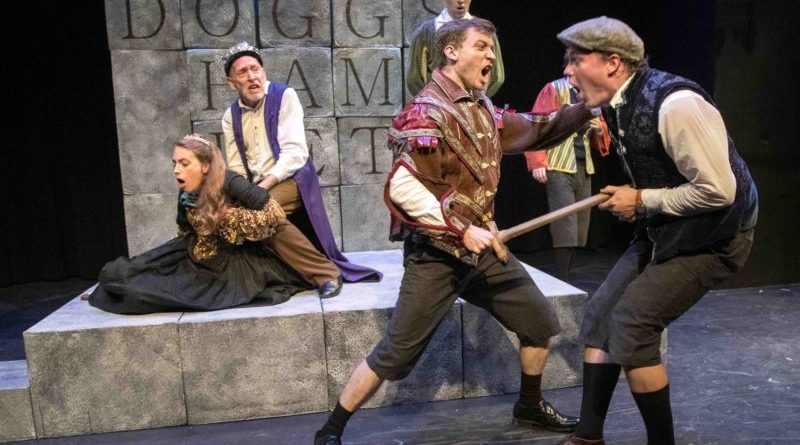INTERVIEW: Tom Stoppard one-acts receive rare off-Broadway revival
Photo: From left, Lucy Van Atta, Peter Schmitz, Christo Grabowski and Connor Wright star in Dogg’s Hamlet, which runs on a double bill with Cahoot’s Macbeth. Photo courtesy of Stan Barouh / Provided by DARR Publicity with permission.
Tom Stoppard is one of the most respected and produced playwrights in the modern era. Theatergoers have enjoyed his many thought-provoking plays, including The Coast of Utopia, Rock ‘n’ Roll, Arcadia and The Real Thing. Two of his lesser-known works — one-acts Dogg’s Hamlet and Cahoot’s Macbeth — are set to receive a rare off-Broadway revival courtesy of the Potomac Theatre Project.
The two shows, intended to play together, are currently running at Atlantic Stage 2 in New York City. Tickets are on sale through Aug. 3, and the double bill runs in repertory with a special evening of works by Harold Pinter, Václav Havel and Samuel Beckett.
Stoppard’s shortened and misguided productions of Hamlet and Macbeth are hilarious to behold, but they also have some interesting poignancy and connection to the outside world. Dogg’s Hamlet deals with schoolboys who only speak a language called Dogg, and they try to mount a production of the famous play by William Shakespeare. Cahoot’s Macbeth surrounds a clandestine production of The Scottish Play, which is performed under the watchful eye of the authorities.
At the helm of both shows is director Cheryl Faraone, producing artistic director and co-founder of PTP/NYC. She has directed The After-Dinner Joke, Arcadia, Vinegar Tom and Serious Money, among other shows.
Recently Hollywood Soapbox exchanged emails with Faraone about the Stoppard double bill. Questions and answers have been slightly edited for style.
What inspired you to direct these two Tom Stoppard plays?
Actually, the inspiration was the other half of our rep, Havel: the Passion of Thought. Havel and Stoppard (who was born in Czechoslovakia) met after Havel was released from prison — the plays in our season share references from that time period and are very similarly about the voice of the artist in a society that limits freedom of expression. But they are funny, human pieces, and Stoppard’s is chock full of his love of wordplay; I find that so exciting to engage.
Did you also have to brush up on the original plays by William Shakespeare? What was the research like?
I am pretty familiar with Shakespeare, so what we spoke about a lot in rehearsal regarding Cahoot’s Macbeth (the title is a direct reference to the playwright Pavel Kohout’s own adaptation) was why this adaptation at this time in this country? What does Macbeth mean here and now?
Hamlet in a way is Stoppard’s in joke. He wrote multiple short versions of it, always managing to include the important plot points (and incidentally omitting Rosencrantz and Guildenstern, the title characters of his first ‘important’ play).
How difficult has it been working with the actors on the different language choices in Dogg’s Hamlet?
It has been a challenge — they have been very good about working to find and evidence the understanding of the text. The difficulty is that we (as Americans) don’t generally use speech in that full-throated, almost musical, and certainly playful, way. So that’s the big challenge — sound, not meaning.
What do you think Cahoot’s Macbeth says about society and government in 2019? Are there modern-day parallels?
Of course, I do. Artists are always viewed with mistrust by ‘the state.’ There are always attempts to belittle, marginalize and silence. It’s an historical truth that has particular relevance right now.
When did you first fall in love with directing for the theater?
Back in college, when no one was interested in me as an actor, but I did take a class in directing, where I was, amazingly, assigned Pinter’s A Slight Ache and Waiting for Godot (by Beckett, of course). An amazingly joyous experience, and it only gets better and better.
By John Soltes / Publisher / John@HollywoodSoapbox.com
Dogg’s Hamlet and Cahoot’s Macbeth, by Tom Stoppard and directed by Cheryl Faraone, runs through Aug. 3 at the Atlantic Stage 2, courtesy of PTP/NYC. Click here for more information and tickets.

